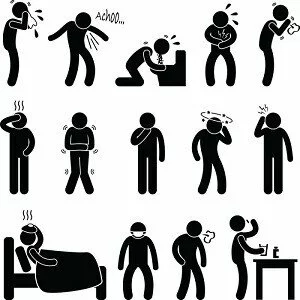1. What is Food Poisoning?
Food poisoning is an illness which arises from eating contaminated food including un-boiled milk. It is characterised by a feeling of being unwell, vomiting, diarrhoea, abdominal pains, cramp and occasionally fever.
The condition is more used to describe the illness referred to above when the food consumption is at community gatherings such as parties, marriages etc. However it can also from eating in hotels or when contaminated food is sold inadvertently to people through stores /groceries/supermarkets.
Period of onset after consumption of the contaminated food varies from 1 hour t0 28 days; depending on the organism involved.
Food poisoning is common during festive periods.
2. What Causes Food Poisoning?
Food poisoning is usually due to germs such as bacteria, virus or parasites. The commonest germs are staphylococcus, clostridium, salmonella, shigella, E. Coli and noro-virus.
The illness is caused by the toxins produced by the germs either outside or inside our body, this determines how quickly the illness starts.
3. How Does Food Poisoning Spread?
The food can be contaminated during growth, production, processing, shipping and preparation; this preparation can include slaughtering of the animal, cutting into small parts which can become contaminated by the feaces of the animal.
There could also be “cross-contamination”, a situation in which the platform used for cutting poultry for example is used for cutting vegetables and fruits without thorough cleansing first.
Food can be contaminated by flies, by infected food handlers, or by food handlers whose hands became contaminated by touching items previously handled by infected persons and forgetting to wash their hands thoroughly with soap and water.
4. When Do You Suspect You May Have Food Poisoning?
Suspect you have food poisoning if you develop vomiting and/or diarrhoea with severe abdominal pains a few hours after eating at a gathering foods such as vegetable salads, fairly cooked meat/ poultry or canned food.
If the stooling and/or vomiting are severe, see your doctor immediately. If not, drink plenty of water during the period to replace lost fluids.
5. What Can Put You at Risk?.
The following can put you at risk— age (more severe and commoner in old age and childhood), pregnancy and chronic diseases with reduced immunity
6. What are the Possible Complications of Rabies?
Complications include severe dehydration, kidney failure and death.
7. How can you prevent Food Poisoning?
You can prevent food poisoning by
- Being careful about what you eat at parties, avoid salads.
- Preparing your food hygienically
- Cooking your meat/poultry thoroughly and eat your food while hot.
- Always washing your hands with soap and water before preparing food
- Covering your food if not ready to eat.
- Reading carefully the label on canned food
- Cleaning your work top after dealing with animal products (meat, poultry) before preparing vegetables and fruits.
-
Always boiling your milk before consumption


No Comments